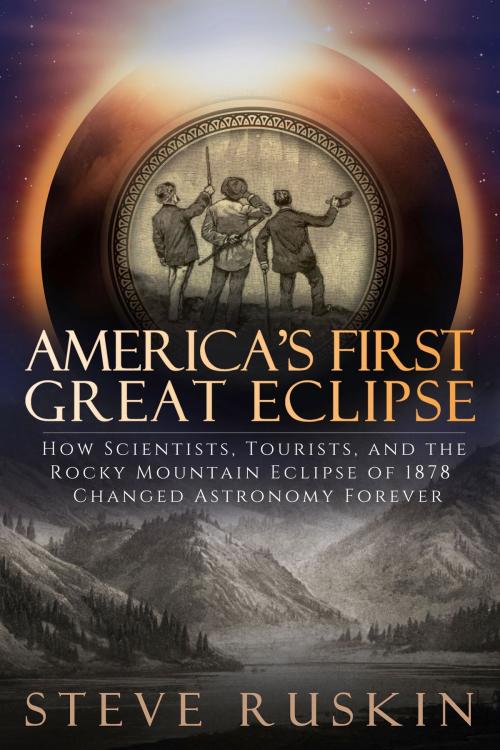America's First Great Eclipse
How Scientists, Tourists, and the Rocky Mountain Eclipse of 1878 Changed Astronomy Forever
Nonfiction, Science & Nature, Nature, Star Observation, Science, Physics, Astronomy, History| Author: | Steve Ruskin | ISBN: | 1230001662283 |
| Publisher: | Alpine Alchemy Press | Publication: | May 5, 2017 |
| Imprint: | Language: | English |
| Author: | Steve Ruskin |
| ISBN: | 1230001662283 |
| Publisher: | Alpine Alchemy Press |
| Publication: | May 5, 2017 |
| Imprint: | |
| Language: | English |
America’s First Great Eclipse takes readers on a thrilling historical journey, revealing that nineteenth-century Americans were just as excited about a total solar eclipse as we are today ... and, like us, were willing to travel thousands of miles to see it.
The upcoming total solar eclipse on August 21, 2017 is being called the Great American Eclipse. But it is not the first eclipse to deserve that title. In the summer of 1878, when the American West was still wild, hundreds of astronomers and thousands of tourists traveled by train to Wyoming, Colorado, and Texas to witness America’s first “Great Eclipse.”
America’s First Great Eclipse tells the story of a country, and its scientists, on the brink of a new era. Near the end of the nineteenth century, when the United States was barely a hundred years old, American astronomers were taking the lead in a science that Europeans had dominated for centuries. Scientists like Samuel Langley, Henry Draper, Maria Mitchell, and even the inventor Thomas Edison, were putting America at the forefront of what was being called the “new astronomy.”
On July 29, 1878, having braved treacherous storms, debilitating altitude sickness, and the threat of Indian attacks, they joined thousands of East-coast tourists and Western pioneers as they spread out across the Great Plains and climbed to the top of 14,000-foot Pikes Peak, all to glimpse one of nature’s grandest spectacles: a total solar eclipse.
It was the first time in history so many astronomers observed together from higher elevations. The Rocky Mountain eclipse of 1878 was not only a turning point in American science, but it was also the beginning of high-altitude astronomy, without which our current understanding of the Universe would be impossible.
22 illustrations.
America’s First Great Eclipse takes readers on a thrilling historical journey, revealing that nineteenth-century Americans were just as excited about a total solar eclipse as we are today ... and, like us, were willing to travel thousands of miles to see it.
The upcoming total solar eclipse on August 21, 2017 is being called the Great American Eclipse. But it is not the first eclipse to deserve that title. In the summer of 1878, when the American West was still wild, hundreds of astronomers and thousands of tourists traveled by train to Wyoming, Colorado, and Texas to witness America’s first “Great Eclipse.”
America’s First Great Eclipse tells the story of a country, and its scientists, on the brink of a new era. Near the end of the nineteenth century, when the United States was barely a hundred years old, American astronomers were taking the lead in a science that Europeans had dominated for centuries. Scientists like Samuel Langley, Henry Draper, Maria Mitchell, and even the inventor Thomas Edison, were putting America at the forefront of what was being called the “new astronomy.”
On July 29, 1878, having braved treacherous storms, debilitating altitude sickness, and the threat of Indian attacks, they joined thousands of East-coast tourists and Western pioneers as they spread out across the Great Plains and climbed to the top of 14,000-foot Pikes Peak, all to glimpse one of nature’s grandest spectacles: a total solar eclipse.
It was the first time in history so many astronomers observed together from higher elevations. The Rocky Mountain eclipse of 1878 was not only a turning point in American science, but it was also the beginning of high-altitude astronomy, without which our current understanding of the Universe would be impossible.
22 illustrations.















